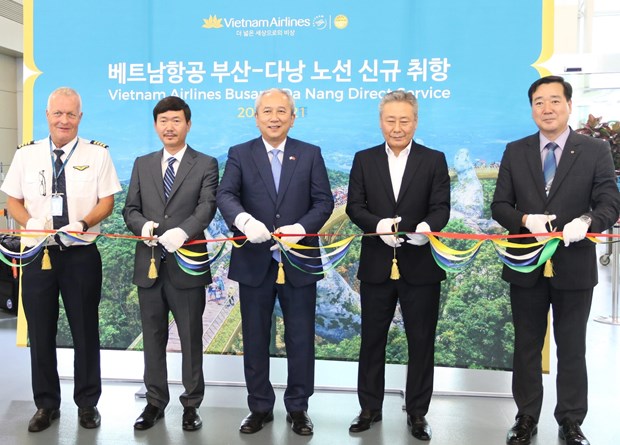The national flag carrier Vietnam Airlines on Sunday launched a new route between the central city of Da Nang and Busan city, connecting Viet Nam and the Republic of Korea (RoK).

The national flag carrier Vietnam Airlines on Sunday launched a new route between the central city of Da Nang and Busan city, connecting Viet Nam and the Republic of Korea (RoK).
This is the third route linking Viet Nam and Busan run by Vietnam Airlines, following those connecting Busan and Viet Nam’s major cities of Ha Noi and HCM City. It is also the seventh route between the two countries.
Vietnam Airlines uses Airbus A321 with four-star international standard for the flights, which are expected to bring more RoK visitors to Viet Nam, and vice versa.
Flights on the route are scheduled to take off at 0:20am from Da Nang and 7:30am from Busan on Tuesday; and at 0:50am from Da Nang and 8:00am from Busan on Saturday.
Speaking at the launch ceremony, Vietnamese Ambassador to the RoK Nguyen Vu Tu hailed efforts make by Vietnam Airlines to open the new air route to Busan – the second largest city of the RoK, meeting the increasing travel demand as well as boosting economic and trade relations between Viet Nam and the RoK.
In 2018, Vietnam Airlines carried over 350,000 passengers on flights connecting Ha Noi, HCM City and Busan, contributing to promoting trade and tourism between the two countries.
Vietnam Airlines has been certified with a four-star airline rating by prestigious international air transport rating organisation Skytrax for the fourth consecutive year. It is striving to become the first five-star airline in Viet Nam after 2020.
From January to June, Vietnam Airlines operated 73,650 safe flights, transporting more than 13.9 million passengers and over 180,000 tonnes of goods, a year-on-year increase of 2 per cent and 1.6 per cent, respectively.
In the last six months of 2019, besides implementing drastic efforts to restructure, Vietnam Airlines plans to complete a new investment of 20 narrow-body Airbus A321neo aircrafts; receiving and operating three wide-body Boeing 787-10 aircrafts; implementing the plan to invest 50 narrow-body aircrafts in the period of 2021-2025.
The carrier will also research and deploy new services to enhance passengers’ experience such as internet on airplanes, replace non-environmentally friendly products, and launch new menus in business class. — VNS





